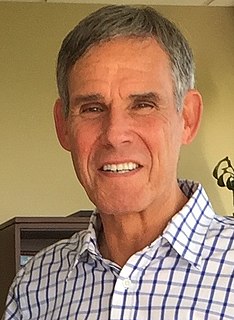A Quote by Craig Venter
Every single cancer is a genetic disease. Not necessarily inherited from your parents, but it's genetic changes which cause cancer. So as we sequence the genomes of tumours and compare those to the sequence of patients, we're getting down to the fundamental basis of each individual person's cancer.
Related Quotes
If I could get every single cancer genome sequence that has been sequenced; if I could ever put it in one repository, we have the capacity to do a million billion calculations per second. We'll be able to find out more in 10 minutes more than it would take 10 Nobel laureates 10 years to find out about the patterns of cancer and the cures for cancer.
Say you have cancer - you have this broad thing we call cancer; we're going to irradiate you and pump this poisonous material into you and hope more of the bad stuff dies than the good. That is going to seem so medieval when we can fix it on a genetic level, and Foundation Medicine is the first step to diagnosing it on a genetic level.
Cancer can be attacked directly by metabolic enzymes and then be assisted by the enzyme diet programme. The second greatest cancer breakthrough of the 20th century is the metabolic organic effect on malignant tumours of correcting the body fluid pH to a non-acidic pH 7.1 to 7.5. A neutral pH 7.0 resists cancer formation. An acid body fluid pH of 6.44 and below permits tumours to biochemically become malignant. At pH 7.5 cancer may become inactive; at 8.5 tumours may disintegrate.
You've got to get away from the idea cancer is a disease to be cured. It's not a disease really. The cancer cell is your own body, your own cells, just misbehaving and going a bit wrong, and you don't have to cure cancer. You don't have to get rid of all those cells. Most people have cancer cells swirling around inside them all the time and mostly they don't do any harm, so what we want to do is prevent the cancer from gaining control. We just want to keep it in check for long enough that people die of something else.
The development of a strategic plan for cancer prevention in medical schools that is supported by all stakeholders - including the medical community, government, the insurance industry, cancer advocacy groups and all those dedicated to cancer prevention - will be the key to inspiring patients to live lifestyles that will decrease cancer risk.
If you sequence a cancerous tumor, you should be able to tailor the therapy according to the root cause of the cancer. But it has taken so long to do the sequencing - which also requires time to prepare the samples and interpret the deluge of data that comes out - that the patients are already undergoing therapy by the process if over.
Treating only terminal cancer patients, the Rand (anti-cancer) vaccine produced objective improvement in 35% of 600 patients while another 30% demonstrated subjective improvement. FDA stopped the vaccine's use in a federal court hearing where neither the cancer patients nor their doctors were allowed to testify.



































